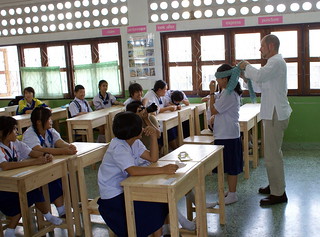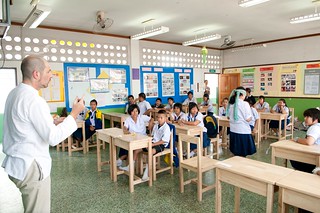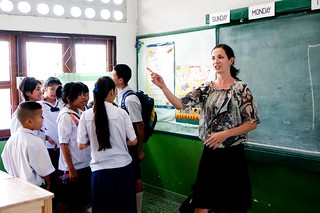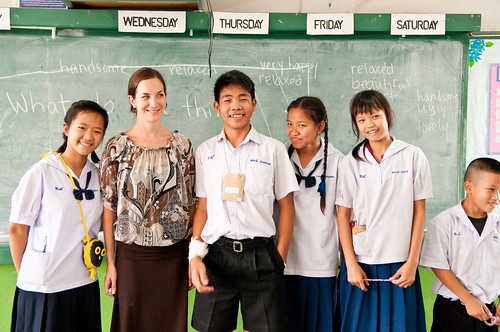Many Thai students grow up thinking that their English ability is next to nil. But sometimes, a few confidence-boosting classes with a native speaker – where they’re understanding more than they expected to and communicating right back – is all it takes to change their minds. As a volunteer English teacher, you become a catalyst for student development.
This project is available in Bangkok and Chiang Mai.
Volunteering in a Local School in Bangkok or Chiang Mai, Thailand

In this project, your daily commute will carry you through some of Thailand’s most authentic neighborhoods. All of the schools in this project are in the city center – most within the boundaries of the ancient moat. Some are part of larger temple complexes, complete with monastic communities and Buddhist shrines; others are stationed on dedicated school grounds. Each has its own dynamic, with anywhere from 100 to 1,000 students enrolled. Volunteer teachers have the option to work in any grade level.
Across Thailand, the school day begins with the raising of the flag and the singing of the national anthem. Students line up in uniform according to their grade level or home room. This is your chance to dole out a few good mornings and give your students a chance to practice the conversational skills you’ve been teaching them. From here, it’s off to class. Lunch is also provided for volunteer teachers. You can take lunch with students or other Thai teachers, or you could strike out for street food and a few minutes of solace.
I was not expecting much besides enjoying my stay in Thailand and planning some lessons for primary English classes, but my experience as a 1st grade English teacher via Friends For Asia proved to be a very fulfilling one. Although my stay of three weeks passed by very quickly, I was welcomed by the students and faculty and was appreciated as a teacher.
I developed a fondness for the children of the primary School, whose abundant smiles, love for Gangnam Style, and enthusiasm in the classroom cultivated my love for teaching. Additionally, the friendly and helpful staff of FFA made the lovely place of Chiang Mai feel like home. My contribution to the children’s English education may have been minute, but I hope that the content they learned will have a lasting impression.
-Clarissa Baquiran, USA, 2013
Making a Difference – Volunteering in Thailand

There’s no shortage of organizations advertising teaching positions in Thailand and greater Southeast Asia, and many of these place teachers in well-funded private schools where the teachers end up feeling more like showpieces than meaningful contributors. Nothing drains a volunteer’s resolve quite so effectively. Friends for Asia actively seeks schools that have no foreign teachers on staff. These are financially strapped public schools that are thrilled at the opportunity to welcome native English speakers.
English Speaking and Listening – The Missing Skills
In Thailand’s public schools, members of the English faculty are well versed in grammar and mechanics. If anything’s missing, it’s the fluency that develops through practice in a native-speaking environment. Regardless of your teaching background, your mere presence in this public school gives students and faculty the chance to take their English skills out of the textbook and put them to work in the real world.
But there’s more to this arrangement than language arts. For many of these students, this is the only chance they have to meaningfully interact with a Westerner. The classroom is a world away from the tourist scene, and you’ll be in a unique position to influence the way these children grow up thinking about foreign cultures.
Volunteer Tasks in the English Education Project

Your role in class depends on the school as well as your own comfort level. You’ll be paired with a Thai teacher and have the option of going into class with this person and simply helping out with daily lessons. However, for anyone with the confidence and the drive to do their own lesson planning, nothing’s quite as rewarding as leading your own class. The students love it, and it gives Thai teachers the chance to catch up on projects and paperwork.
The time you’ll spend in class depends on the school’s needs as well as the time of year. Generally, you’ll be in front of students anywhere from 10 to 20 hours per week. Volunteers with plenty of ambition can donate more time planning and possibly helping out with projects at school.
Volunteering with Friends for Asia is one of the most amazing things I have ever done in my life! I worked teaching English in a school to kids between the ages of 6-12 and they were a joy to teach. It meant that I could have complete independence teaching classes how I wanted and got to play games with the kids.
The kids are very loveable, always hugging you, and they love high fives! For anyone who wants a completely life changing experience, I would recommend FFA English Teaching Project 100%.
-Ankita Karn, UK, 2012
English Volunteer Qualifications

Volunteer English teachers have to be at least 18 years old to be considered. It’s also important that they’re fluent in written and spoken English. While veteran teachers are enthusiastically welcomed, teaching credentials are not required to volunteer to teach English in Thailand.
Beyond this, Friends for Asia requires all volunteers who will be working directly with children to file a certified police background check before their start date.
Volunteer Project Fees for the English Education Project
Participation in the English Education Volunteer Project starts at a minimum of two weeks at $799. Each additional week is $119. Read more about why we require fees for volunteers and interns.
Volunteer Project Fee Includes
- Comprehensive Pre-Departure Information
- Visa paperwork (for projects over 8 weeks)
- Airport pick up
- Accommodation during orientation and entire project time
- Breakfast every morning
- Lunch every work day
- 2 day Orientation (including half day city tour, cultural dinner and show)
- Onsite Coordinator
- 24 hour emergency assistance
- Written record of service completion (for volunteers that successfully complete their project).
Volunteer Project Fees Do Not Include
- Travel to/from Home and Project City – Chiang Mai or Bangkok (airfare, train tickets, etc.)
- Thailand visa costs (if applicable)
- International Medical Insurance
- Cost of criminal police background check (required for this project)
- Cost of transportation to and from Project site and and accommodation (roughly $2 per day)
- Lunches on weekends
- Dinner
Thailand Teaching Volunteer Start Dates for 2024
- the 8th of January – arriving on Friday, the 6th of January
- the 22nd of January – arriving on Friday, the 19th of January
- the 5th of February – arriving on Friday, the 2nd of February (maximum four week program)
- Closed for Thai School Summer
- the 20th of May – arriving on Friday, the 17th of May
- the 3rd of June – arriving on Friday, the 31st of May
- the 17th of June – arriving on Friday, the 14th of June
- the 1st of July – arriving on Friday, the 28th of June
- the 15th of July – arriving on Friday, the 12th of July
- the 5th of August – arriving on Friday, the 3rd of August
- the 19th of August – arriving on Friday, the 16th of August
- the 2nd of September – arriving on Friday, the 30th of August (maximum four week program)
- Closed for Thailand mid-school year break
- the 4th of November – arriving on Friday, the 1st of November
- the 18th of November – arriving on Friday, the 15th of November
- the 2nd of December – arriving on Friday, the 29th of November
- the 16th of December – arriving on Friday, the 13th of December
Thailand Teaching Volunteer Start Dates for 2025
- the 6th of January – arriving on Friday, the 3rd of January
- the 20th of January – arriving on Friday, the 17th of January
- the 3rd of February – arriving on Friday, the 31st of January (4 week project maximum before break)
- Closed for Thai School Year Summer
- the 19th of May, – arriving on Friday, the 16th of May
- the 2nd of June, – arriving on Friday, the 30th of May
- the 16th of June, – arriving on Friday, the 13th of June
- the 7th of July, – arriving on Friday, the 4th of July
- the 21st of July, – arriving on Friday, the 18th of July
- the 4th of August, – arriving on Friday, the 1st of August
- the 18th of August, – arriving on Friday, the 15th of August
- the 1st of September, – arriving on Friday, the 29th of August (4 week project maximum before break)
- Closed for Thai mid-school year break
- the 3rd of November, – arriving on Friday, the 31st of October
- the 17th of November, – arriving on Friday, the 14th of November
- the 1st of December, – arriving on Friday, the 28th of November
- the 15th of December, – arriving on Friday, the 12th of December
Volunteer Experiences in the English Education Project
When I first found the Friends For Asia website I thought it was an amazing opportunity and then as I thought about it more I was skeptical because I thought it was too good to be true. After some thought, I finally decided to go along and do it and it was the best decision I’ve made. Thailand was the last place I’d ever though I’d visit and now it has become a place I will very dearly miss.
Volunteering for me was also a test run to see if teaching is a profession I would like to seriously pursue and this project has got me thinking even more about leaning towards teaching as a career. The kids were very loving and welcoming and if I didn’t live so far I would seriously consider volunteering more often. In fact, I would not hesitate to do this again if I were given the opportunity again in the future. I would highly recommend this program to anyone thinking of doing it because it is such a great opportunity to meet new people and learn about such a unique culture compared to my own. I was fortunate enough to come with 4 of my greatest friends and I have made irreplaceable and valuable memories on this trip.
Compared to other volunteering organizations that charge you thousands to give your time and effort, Friends For Asia is affordable and worth it’s price. You know exactly what the money is going towards and you get so much out of it. All in all, I have been very satisfied with my trip and this experience is one I will remember and cherish for a long time and I hope that many more people get to experience this as well by volunteering in Thailand too.
-Olivia Veizas, USA, 2013
I believe it is best to try to free oneself of any pre-conceptions and put aside what one has heard regarding Thai public schools before volunteering in one. Based upon Western standards, Thai schools, based upon the general mantra one hears, are very disorganized with a lack of any perceptible order. Yet, I believe, there is a collective rhythm and spirit within these schools that is untranslatable within Western standards. There is an inherent order, though different from that to which we are accustomed. Growth, personally and communally, is measured and experienced in many ways in these schools, as it should be in all schools, western or not.
My work in the the school has provided me with helpful insights and practices that I will seek to utilize and apply in my teaching and administration back in the States.The school exudes a strong sense of community, with the students often being the foremost exemplars of making a school community one of family and partnership.
-Daniel Siegel, Canada, 2012
English Education Volunteer Project Logistics
Daily School Schedule
- 8:00 Morning Assembly
- 8:30 classes begin
- 11:10 Lunch/Break
- 12:10 After lunch Assembly and classes begin again
- 4:20 School ends for the day.
A volunteer is free to come and leave the school as they wish. It’s recommended to stay at the school during most of the day to get to know the staff and students as well as possible, but if a volunteer is free to leave the school during times when they don’t’ have classes, if they have something they would like to do off campus.
Teaching a Lesson in the English Education Project
It is important to plan and prepare lessons. For the inexperienced teacher, lengthy, in-depth lesson plans are not necessary. It is however, crucial that when preparing/planning a lesson that one must write down a simple procedure of how they plan to conduct the class. Attempt to cover all four skills (speaking, listening, reading and writing) in the period of an hour class. Below is a basic plan as to how inexperienced teachers can plan lessons:
- Introduction to the class and a short fun warm up activity
- Presentation of new material/review of already covered material
- Practice of the material presented
- Speaking activity then writing activity using the material covered
- A quick wrap up / closing activity
English Education Project – Suggestions for Topics
- Colors
- Numbers
- Time
- Animals
- Days of the week/months of the year
- Sports
- Hobbies
- Sports
- Food
- Places around town
- Countries / travel vocabulary
- Things at home
- Things at school
- Music
English Education Project – Suggestions for Basic Activities
- Tick tack toe (with vocabulary)
- Memory (vocabulary and definition/picture)
- Word searches
- Crossword puzzles
- Skits
- Dialogue type games
- Songs (to follow, but not sing)
- Hangman
- Scrabble type games
- Bingo (with numbers, pictures, vocabulary, whatever)
- Pictionary
- Spin the bottle (conversation / vocabulary, not kissing)
- Simon Says
- Running Dictation
English Education Materials, Stationary and Books
Most of the schools use student textbooks and workbooks in their English courses. With this being said, most of the textbooks are not very well written and are often times far above the abilities of the students that are using them. Some volunteers are free to use any material in their lessons, however it is recommended that volunteers try to use the textbooks and workbooks when possible, as it is important that the students follow the curriculum, especially considering the students will continue to use the textbooks and workbooks after end of the volunteer’s service. With this being mentioned, please don’t think that the textbooks and workbooks have to be used exclusively. Pictures and different materials from a volunteer’s country can be a lot of fun and be incredibly educational.
There are stationary stores close to many of the schools. Unfortunately there is no budget available for volunteer teacher resources. Therefore if a teacher wants to purchase supplies or materials for their classes they will have to do so with their own money. Friends for Asia staff will be happy to show you the way or take you to a stationary store during your orientation or service to help you prepare for your lessons. Most of the schools have some type of procedure for copies that volunteers are allowed to use. For specific information regarding the system of making copies, a volunteer would have to consult their coworkers at their assigned school.
Volunteer Transportation in Chiang Mai
Airport pick up, the city tour and the transportation to and from the cultural show and dinner are covered in the project fee. Friends for Asia staff also sends volunteers and interns to seek medical assistance in non-emergency situations. Obviously, in the case of an emergency a proper ambulance would be called and used. A volunteer will have to cover the cost of their own transportation if they make multiple appointments to see a doctor or dentist.
Volunteers in the English Education Volunteer Project are responsible for their daily commute to and from the Volunteer House and their school. More details are listed below, but expect to pay anywhere between $1.50 – $3.00 per day for transportation. Although all the schools where volunteers work are a decent walk from the house, many volunteers take this on foot option to take in more of Chiang Mai and Surat Thani during their service.
Transportation by SongThaews (Thai style mini-buses) are normally 20 THB (roughly $0.70 USD) per ride. Therefore, most volunteers spend around $1.50 USD a day on transportation to and from work. Tuktuks (three wheeled, motorized rickshaws) are more expensive, but faster. A regular priced ride in a tuktuk is about 50 THB ($1.60 USD). On your first day of your project, the volunteer coordinator will escort you to your school and introduce you to the administration at the school. Volunteers travel with the coordinator on that day by local transportation in an attempt to teach volunteers how to get to the school and back by themselves on the following days of their volunteer service.






